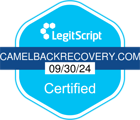I’m excited to have Dean Taraborelli with us. He’s the innovative mind behind the Sanctuary at Sedona, where he has developed a groundbreaking method for treating addiction and trauma. This unique, non-12 step residential center in Arizona is renowned for its approach to dealing with a broad spectrum of addictions, as well as depression, anxiety, and PTSD.
At the heart of the Sanctuary is its Integrative Addiction Recovery program, a pioneering effort that blends the latest scientific research with ancient healing traditions. This holistic approach treats the whole person rather than just the symptoms. Dean’s commitment and dedication have helped countless individuals embark on a journey of healing, empowering them to live fulfilling and enriched lives.
We talk about his personal journey and inspiration for the Sanctuary at Sedona. We explore the moments that set him on the path to recovery and sobriety. Dean shares insights into the core philosophy with an emphasis on health and feeling good. We also discuss the effectiveness of various healing modalities, psychedelics, and more.
LISTEN below:
Links mentioned in this episode:
- Camelback Recovery
- I Love Being Sober YouTube
- The Sanctuary at Sedona
- Dean Taraborelli
- Dean Taraborelli LinkedInGrof Transpersonal Training
FOLLOW US ON OTHER SOCIAL PLATFORMS!
Instagram: https://bit.ly/KickAssSoberLifeIG
Linkedin: https://bit.ly/TimLinkedin
Facebook Page: https://bit.ly/CamelbackFB
Youtube Channel: https://bit.ly/CamelbackYoutube
Spotify: https://spoti.fi/3ISvBio
Apple Podcast: https://apple.co/3RLAU6X
For more links and resources check this out: https://linktr.ee/camelbackrecovery
Visit our website at https://www.camelbackrecovery.com/
or call us at 480-618-5430 for inquiries.
AUDIO TIMESTAMPS:
- [04:33] Dean shares his journey that led to founding the Sanctuary at Sedona. In his efforts to manage his addiction he went to treatment frequently.
- [06:03] After many relapses, he started expanding his search worldwide.
- [07:06] He realized that he knew more about addiction than many of the counselors, and realized we need a new model of treatment.
- [08:04] Sanctuary is a non 12-step program, but it’s not anti 12-step.
- [09:20] He realized that there was a lot of science that could be applied to getting well and improving mental health.
- [10:29] The mind-body connection is indisputable. Our unconscious mind is more powerful than our conscious mind. The holistic approach enhances the other treatment methods.
- [12:06] The mind influences the body.
- [13:24] Reprogramming the unconscious mind. Repetition, constant hypnosis, and different meditative states. Breath work.
- [14:28] The nervous system can be accessed without talking about a lot of stuff. The nervous system is energy. When we begin to understand what influences this energy the work begins.
- [15:46] Trauma is stored in our brain and affects all of the decisions we make, especially in a time of stress.
- [16:54] We need to work on the monologue that makes our inhibitions.
- [17:34] The program drew from experts like David Perlmutter, Mark Hyman, and Joe Dispenza.
- [18:27] At Sanctuary people are treated with loving, kindness, and care.
- [19:21] Dean went to a conference in Sedona and ended up meeting his future teacher. It was like his talk was for him.
- [20:42] Energy medicine dissipates charge.
- [22:24] Dean’s recovery path is like his wellness path. Recovery means being no longer defined by the use of the substance.
- [23:46] A daily process of health translates into recovery.
- [29:12] The connection between the gut and the brain. Depression and anxiety being caused by inflammation.
- [31:37] For aftercare, the Sanctuary likes the focus on what makes people feel good when finding support.
- [33:43] The core philosophy behind the Sanctuary. Every thought changes the brain so use it to your advantage.
- [35:42] We can up regulate and down regulate genes. They focus on getting to the root cause also.
- [39:01] Inflammation is usually a metabolism related thing.
- [41:30] Some of the most impactful modalities utilized at Sanctuary include a combination of modalities that help quiet the brain and open up the possibilities of different neural networks.
- [52:34] Psychedelics work on the higher brain as opposed to alcohol or marijuana. What we take is a very personal choice.
- [56:50] Helping people and giving them different ideas and strategies for recovery is Dean’s goal.
- [57:22] Recovery is much better on the other side, and the process isn’t going to be as bad as you think it could be.



